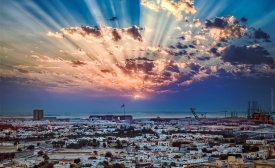soft power
CCTV America talks to Peter Shiao, founder of Orb Media Group about the future of increased China-Hollywood cooperation. Co-production and joint funding can be mutually beneficial—Chinese investment can get an expensive project started and stimulate the foreign film industry, while at the same time allowing Chinese funders a learning opportunity and adding to Beijing’s soft power reserves.
The American Center at Moscow’s Rudomino All-Russia State Library of Foreign Literature has become the latest in a long line of American cultural institutions to be shut down as the political confrontation between Russia and the West widens.
But, whereas this fits in with the larger patterns of Pakistan’s history, the emergence of a dynamic Indian honcho with the world in his fists is something Sharif could not have anticipated. If only Sharif knew how to take selfies and understood the intricacies of Snapchat.
After the 2016 election, the new government has realised that soft diplomacy aligned with a more independent foreign policy is far more effective in the long-term than military force. As a consequence, the government establishes a new Department of Regional Cooperation.
Taiwanese rapper Soft Lipa (蛋堡), Latin rap rock band Boxing (拳) and Chinese Canadian pop rock band io will be featured in a "Taiwan Night" concert that is part of the event, according to GCA Entertainment, which is jointly organizing the concert with Taiwan's Ministry of Culture.
Narendra Modi takes on Xi Jinping in a soft-power battle in America. “ANYTHING Xi can do, I can do better,” seemed to be the mantra of Narendra Modi, India’s prime minister, as he toured America in late September, hot on the heels of China’s president, Xi Jinping.

The second edition of Nation Branding: Concepts, Issues, Practice is now available, and features the role of nation branding and image management for international governments including China, Cuba, Ghana, India and the United Arab Emirates.
A recent proposal of the Information and Broadcasting (I&B) Ministry to this effect received a big thumbs-up from Prime Minister Narendra Modi. Now the ministry has started planning the dedicated corpus — funded by the government and the film industry — to finance full-fledged publicity campaigns for India’s entries in the run-up to the Academy Awards.







